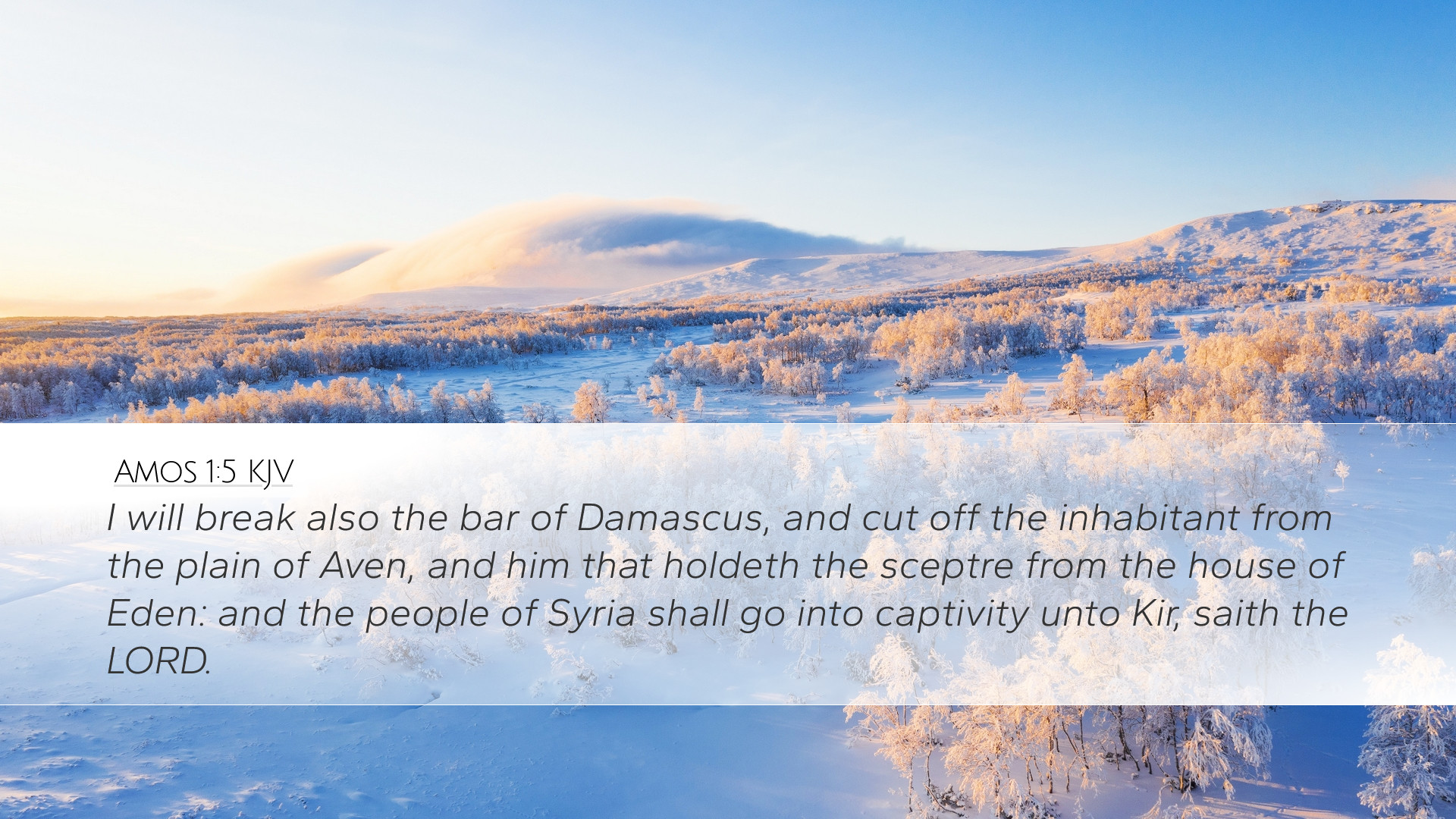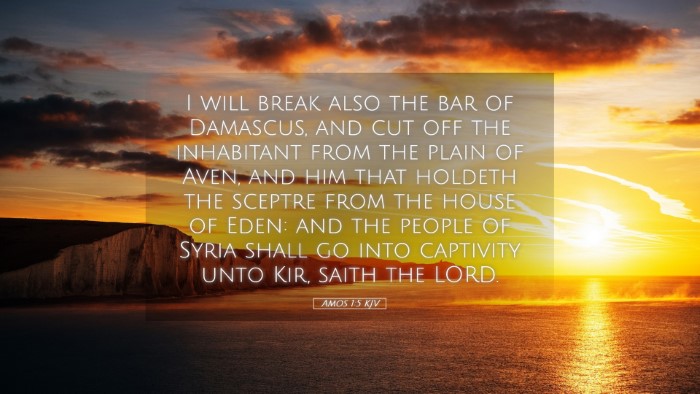Old Testament
Genesis Exodus Leviticus Numbers Deuteronomy Joshua Judges Ruth 1 Samuel 2 Samuel 1 Kings 2 Kings 1 Chronicles 2 Chronicles Ezra Nehemiah Esther Job Psalms Proverbs Ecclesiastes Song of Solomon Isaiah Jeremiah Lamentations Ezekiel Daniel Hosea Joel Amos Obadiah Jonah Micah Nahum Habakkuk Zephaniah Haggai Zechariah MalachiAmos 1:5
Amos 1:5 KJV
I will break also the bar of Damascus, and cut off the inhabitant from the plain of Aven, and him that holdeth the sceptre from the house of Eden: and the people of Syria shall go into captivity unto Kir, saith the LORD.
Amos 1:5 Bible Commentary
Commentary on Amos 1:5
Amos 1:5 states: “I will break also the bar of Damascus, and cut off the inhabitant from the plain of Aven, and him that holdeth the sceptre from the house of Eden: and the people of Syria shall go into captivity unto Kir, saith the LORD.” This verse stands as a pronouncement of judgment from God against Damascus, which symbolizes divine retribution against nations that oppose Him.
Contextual Overview
The prophecy of Amos occurs during a time of relative prosperity in Israel, yet it is a period marked by rampant immorality, injustice, and religious ritualism. This backdrop is crucial as it reflects the moral decay within Israel, which Amos condemns while simultaneously prophesying against surrounding nations, including Damascus. The specific mention of Damascus here highlights not only the geopolitical context but also God's sovereignty over all nations, emphasizing His power in judgment.
Analysis of Key Phrases
- “Break the bar of Damascus”: This phrase carries significant weight, suggesting a dismantling of defense mechanisms. Matthew Henry emphasizes that God’s power can dismantle even the most fortified and secure places, illustrating the futility of human defenses against divine will.
- “Cut off the inhabitant from the plain of Aven”: The term 'Aven' is thought to refer to a place associated with idolatry. Albert Barnes notes that Aven, meaning “vanity” or “wickedness”, indicates the judgment against a land characterized by false worship and perverse living. This emphasizes the seriousness of turning away from God.
- “The holdeth the scepter from the house of Eden”: Here, there is a mention of a ruler or sovereign. Adam Clarke interprets this as God’s judgment reaching even the political elites, suggesting that no one, regardless of status or power, is immune to God’s decrees. The reference to Eden, reminding one of paradise, stands in stark contrast to the impending doom.
- “The people of Syria shall go into captivity unto Kir”: The prophecy foretells captivity, which serves as a direct consequence of their rebellion. Matthew Henry asserts that this indicates a loss of autonomy and reflects God’s ultimate authority over nations. Kir is identified as a place of exile, highlighting the fate awaiting those who defy God's commandments.
Theological Implications
This verse prompts deep theological reflection regarding the nature of God's sovereignty and justice. The judgments of God are not arbitrary; they arise from a consistent principle of accountability for nations and individuals alike. The warning against Damascus acts as a reminder of the moral obligations that come with divine favor.
Furthermore, the mention of captivity illustrates not merely a physical displacement but also a spiritual implication—Israel's neighboring nations too have responsibilities before God. Barnes stresses that God's familiarity with each nation entails a corresponding expectation of righteousness, showing that justice extends universally beyond Israel.
Practical Applications
For today’s reader, Amos 1:5 challenges individuals and communities to reflect on their own spiritual and ethical stands. The verse reminds us that spiritual complacency, idolatry, and injustice have dire outcomes. It serves as an admonition for believers to pursue righteousness and holiness, recognizing that God’s judgment does not only fall on the wayward nations but can also strike at the heart of God’s own people when they stray from His commands.
Moreover, this passage encourages an understanding of our own societal contexts. The question arises: are we, as a community of faith, complicit in systemic injustices or idolatrous practices? Just as Damascus faced God’s retribution, contemporary societies face similar judgments when they abandon divine principles in pursuit of secular values.
Conclusion
In conclusion, Amos 1:5 serves as a poignant reminder of God's unyielding justice and sovereignty. It calls believers to an awareness of the holiness that God demands, urging a return to righteousness in both individual and communal life. By drawing upon the insights from public domain commentaries, we can appreciate not only the historical significance of this passage but also its enduring relevance for our lives today.


